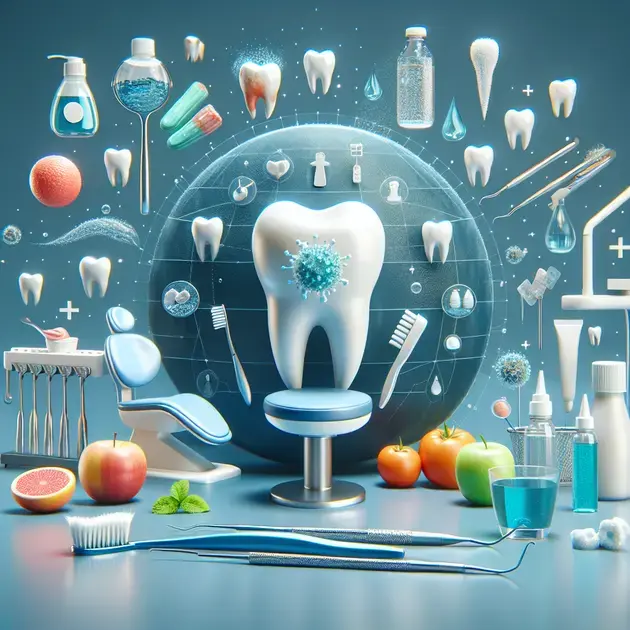Are you struggling with a toothache caused by decay? Look no further, as this comprehensive guide will provide you with effective toothache decay treatment options to alleviate your pain and discomfort.
With the advancements in dental technology and treatment methods, there are now various innovative solutions available to tackle tooth decay and its associated pain. This guide will walk you through the most up-to-date techniques and remedies to help you find relief and improve your oral health.

Understanding the Causes of Tooth Decay
To understand how to effectively treat tooth decay, it is essential to first grasp its causes. Tooth decay, also known as cavities or dental caries, is primarily caused by plaque buildup on the teeth. Plaque is a sticky film of bacteria that forms on the teeth and produces acid when it comes into contact with sugary or starchy foods. This acid gradually wears down the enamel, leading to cavities.
Step 1: Maintain Good Oral Hygiene
One of the best ways to prevent tooth decay is by practicing good oral hygiene. This includes brushing your teeth at least twice a day with a fluoride toothpaste, flossing daily, and using mouthwash to help reduce bacteria in your mouth. Additionally, regular visits to the dentist for cleanings and check-ups are crucial in detecting and treating early signs of decay.
Step 2: Watch Your Diet
Your diet plays a significant role in the development of tooth decay. Limiting the consumption of sugary and acidic foods and drinks can help prevent the formation of plaque on your teeth. Instead, opt for a balanced diet rich in calcium, phosphorus, and vitamins to promote strong and healthy teeth.
Step 3: Consider Fluoride Treatments
Fluoride is known for its ability to strengthen tooth enamel and prevent cavities. Some dental products, such as toothpaste and mouthwash, contain fluoride to aid in the remineralization of the teeth. Your dentist may also recommend professional fluoride treatments to provide an extra layer of protection against decay.
Step 4: Address Dry Mouth Concerns
Having a dry mouth can increase your risk of tooth decay as saliva helps neutralize acids in the mouth and wash away food particles. If you have chronic dry mouth, consider using artificial saliva products or speaking with your healthcare provider to address any underlying causes.
Step 5: Seek Early Treatment for Tooth Decay
If you suspect you have a cavity or tooth decay, it is crucial to seek treatment promptly. Ignoring the issue can lead to further damage and complications. Your dentist may recommend options such as fillings, crowns, or root canal therapy, depending on the extent of the decay.
Exploring Modern Treatment Options
Advancements in dental technology have led to a variety of modern treatment options for addressing tooth decay. From minimally-invasive procedures to innovative materials, there are several approaches to effectively treat and prevent cavities.
Step 1: Laser Dentistry
Laser dentistry is a minimally-invasive treatment option that can be used for various dental procedures, including treating tooth decay. The laser can remove decayed tissue with precision while preserving more of the healthy tooth structure compared to traditional methods. This approach results in less discomfort and faster healing times for patients.
Step 2: Composite Fillings
Composite fillings, also known as tooth-colored fillings, are an aesthetically pleasing alternative to traditional silver amalgam fillings. These fillings are made of a durable composite resin material that can be color-matched to your natural teeth, providing a seamless restoration for cavities.
Step 3: Dental Sealants
Dental sealants are a preventive treatment option that can help protect the chewing surfaces of the molars from decay. The sealant is a thin plastic coating applied to the pits and grooves of the teeth, acting as a barrier to prevent bacteria and food particles from settling in these areas and causing cavities.
Step 4: Fluoride Varnish
Fluoride varnish is a topical treatment applied by a dentist to the teeth to strengthen enamel and prevent decay. This concentrated form of fluoride is highly effective in remineralizing the teeth and reducing the risk of cavities. Regular applications of fluoride varnish can provide long-lasting protection for your teeth.
Step 5: Inlays and Onlays
Inlays and onlays are indirect fillings that are used to restore teeth with moderate decay or damage. Unlike traditional fillings, which are molded into place, inlays and onlays are fabricated in a dental lab and then bonded to the tooth surface. These restorations offer a precise fit and can strengthen the tooth structure for long-term durability.

Understanding the Importance of Oral Hygiene
Oral hygiene is crucial for maintaining overall health and well-being. By taking care of our teeth and gums, we can prevent various dental problems such as tooth decay, gum disease, and bad breath. Brushing your teeth at least twice a day, flossing regularly, and visiting your dentist for routine check-ups are essential steps in maintaining good oral hygiene.
One of the key reasons why oral hygiene is so important is its impact on preventing tooth decay. When we neglect our oral health, plaque and bacteria can build up on our teeth, leading to cavities and decay. By following a proper oral hygiene routine, we can remove these harmful substances and protect our teeth from damage.
In addition to preventing tooth decay, good oral hygiene also plays a role in maintaining a bright and confident smile. Stained or yellow teeth can be a result of poor oral hygiene habits, such as inadequate brushing and flossing. By prioritizing oral care and keeping our teeth clean, we can enhance the appearance of our smile and boost our self-esteem.
Furthermore, poor oral hygiene has been linked to various systemic health issues, including heart disease and diabetes. The mouth is a gateway to the rest of the body, and bacteria from dental infections can enter the bloodstream, causing inflammation and contributing to other health problems. By practicing good oral hygiene, we can reduce the risk of these complications and promote overall wellness.
In conclusion, understanding the importance of oral hygiene is essential for maintaining a healthy mouth and body. By incorporating regular brushing, flossing, and dental check-ups into our routine, we can prevent tooth decay, improve our smile, and safeguard our overall health.
Tips for Preventing Tooth Decay
Preventing tooth decay is a key goal of maintaining good oral hygiene. By following some simple tips and adopting healthy habits, we can reduce the risk of cavities and keep our teeth strong and healthy. Here are some effective strategies for preventing tooth decay:
Brushing and flossing:
Brushing your teeth at least twice a day and flossing regularly are essential for removing plaque and food particles that can lead to decay. Use a fluoride toothpaste and a soft-bristled brush to effectively clean your teeth and gums.
Limit sugary and acidic foods:
Sugary and acidic foods can contribute to the erosion of tooth enamel and the formation of cavities. Limit your intake of sugary snacks and drinks, and opt for healthier alternatives such as fruits, vegetables, and water.
Visit your dentist regularly:
Regular dental check-ups are important for detecting and treating any early signs of tooth decay. Your dentist can also provide professional cleanings and fluoride treatments to strengthen your teeth and prevent decay.
Use fluoride products:
Fluoride is a mineral that helps to strengthen tooth enamel and prevent cavities. Use fluoride toothpaste and mouthwash as part of your daily oral hygiene routine to protect your teeth from decay.
Avoid smoking and tobacco products:
Smoking and using tobacco products not only stain your teeth but also increase the risk of gum disease and tooth decay. Quitting smoking can improve your oral health and overall well-being.
By following these tips for preventing tooth decay, you can maintain a healthy and happy smile for years to come. Prioritizing oral hygiene and adopting good habits will help you preserve the health of your teeth and gums and prevent the need for extensive dental treatments in the future.
The Role of Diet in Dental Health
Your diet plays a significant role in maintaining good dental health. The foods and beverages you consume can impact the health of your teeth and gums, influencing factors such as tooth decay, gum disease, and overall oral hygiene. By making healthy dietary choices and prioritizing nutrition, you can support your oral health and prevent dental problems in the long run.
Importance of a balanced diet:
Eating a balanced diet that includes a variety of nutrients is essential for promoting dental health. Foods rich in vitamins, minerals, and antioxidants help to strengthen tooth enamel, fight bacteria, and maintain healthy gums. Incorporate fruits, vegetables, whole grains, lean proteins, and dairy products into your meals for optimal oral health.
Hydration and water intake:
Staying hydrated is important for saliva production, which plays a crucial role in protecting your teeth against harmful bacteria. Drinking plenty of water throughout the day helps to rinse away food particles, neutralize acids, and maintain a healthy pH balance in your mouth.
Avoiding sugary and acidic foods:
Sugary and acidic foods can promote the growth of bacteria and lead to the formation of cavities and tooth decay. Limit your consumption of sugary snacks, sodas, and candies, and opt for healthier alternatives such as fresh fruits, vegetables, and nuts to protect your dental health.
The impact of lifestyle habits:
Smoking, excessive alcohol consumption, and poor dietary choices can all negatively affect your dental health. These habits can increase the risk of gum disease, tooth decay, and other oral health problems. By making lifestyle changes and focusing on a nutritious diet, you can improve your overall oral health and well-being.
In conclusion, the role of diet in dental health is significant and cannot be overlooked. By maintaining a balanced diet, staying hydrated, and avoiding harmful foods and habits, you can support your oral health and prevent dental issues. Prioritize nutrition and make smart dietary choices to ensure a healthy and happy smile for years to come.
Conclusion
Maintaining good oral hygiene is crucial for overall health and well-being. By prioritizing habits like brushing twice a day, flossing regularly, and visiting the dentist, we can prevent dental issues such as tooth decay, gum disease, and bad breath. These practices not only protect our teeth from damage but also contribute to a bright and confident smile, boosting self-esteem.
Moreover, understanding the link between oral hygiene and systemic health problems like heart disease and diabetes emphasizes the importance of a proper oral care routine. Bacteria from oral infections can escalate into broader health issues, underscoring the need for regular dental care to reduce these risks and promote overall wellness.
Additionally, the role of diet in dental health cannot be overstated. A balanced diet rich in nutrients, hydration, and avoidance of sugary, acidic foods is key in preventing tooth decay and gum disease. Lifestyle habits such as smoking and poor dietary choices can have adverse effects on oral health, highlighting the significance of making informed dietary and lifestyle decisions to ensure a healthy smile for years to come.